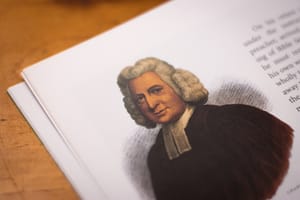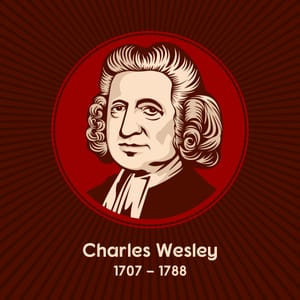The Clapham Sect and the slave trade (1)
Roger Fay
On 24 February 1791, only a week before he died, John Wesley wrote his final letter. It was to William Wilberforce, and all about Wilberforce’s struggles against the slave trade.
It read: ‘Dear Sir, Unless the divine power has raised you up to be as Athanasius contra mundum, I see not how you can go through your glorious enterprise in opposing that execrable villainy which is the scandal of religion, of England, and of human nature.
‘Unless God has raised you up for this very thing, you will be worn out by the opposition of men and devils … Reading this morning a tract wrote by a poor African, I was particularly struck by that circumstance that a man who has a black skin, being wronged or outraged by a white man, can have no redress … What villainy is this?
‘That he who has guided you from youth up may continue to strengthen you in this and all things, is the prayer of, dear sir, Your affectionate servant, John Wesley.’
Clapham
Wilberforce would need Wesley’s encouragement more than he realised, for two months later his first parliamentary motion for the abolition of the slave trade would be defeated. It would be 16 long years before Wilberforce succeeded.
When Wilberforce received the letter, the Clapham Sect was a year away from existing as a self-conscious group, although Wilberforce often visited friends at Clapham — a pleasant village, three miles south west of London.
Clapham would become a key location for the Sect. However, the group’s endeavours would not just be Clapham-centred, but international and far-reaching in scope. We need to note too that the word ‘Sect’ is misleading. It was not a sect as we use the term today.
The group mostly comprised loyal Anglicans and was, for the most part, decidedly evangelical. But it did include, for example, William Smith, a Unitarian MP and zealous advocate of philanthropic causes; the Sect was prepared where necessary to make common political cause with free-thinking radicals, many of whom detested the slave trade.
Then again, ‘Clapham Sect’ was not a term the Sect itself would have recognised! Their contemporary, somewhat derisory label was ‘saints’. ‘Clapham Sect’ originated a generation later, in 1844, through an essay written by Sir James Stephen, while their endeavours took place much earlier, between 1792 and 1815.
‘Villainy’
Wesley’s letter to Wilberforce emphasised, first, that the slave trade was ‘execrable [detestable] villainy’, and, second, that it would be very difficult to stop. Neither assertion was the least exaggerated.
Consider first the trade’s ‘villainy’. Britain’s slave trading began in 1562 with Sir John Hawkins transporting 300 slaves, some captured from Portuguese slave ships, across the Atlantic to Hispaniola.
Over the next two centuries, as a result of the sugar revolution, slave trading with the Caribbean expanded greatly. By the 1770s, 84 per cent of enslaved Africans in Jamaica were working on sugar plantations.
Barbados and Jamaica were the main islands for growing sugar cane, followed by the Leeward Island settlements of Antigua, St Christopher, Nevis and Montserrat.
Liverpool, London and Bristol were Britain’s main slaving ports; 1771 saw 107 ships leave Liverpool on slaving voyages, compared with 58 from London and 20 from Bristol.
The number of slaves transported was enormous by any count. William Wilberforce estimated that in 1789 alone Britain transported 38,000 slaves. By 1807, 2-3 million African slaves had been transported to the Caribbean on British ships.
Dr Robert Oliver has described how the triangular trade worked: ‘By the Treaty of Utrecht in 1713, Britain secured from the French and the Spaniards a virtual monopoly of the Atlantic slave trade. At the same time, she contracted to supply the Spanish West Indies with 144,000 slaves within thirty years.
‘The traders left Britain with woollens, cotton goods, trinkets, guns and gunpowder. These were traded on the African coast for slaves, often supplied by the Africans themselves as a result of tribal warfare.
‘These slaves were then shipped on the middle passage across the Atlantic to the West Indies, the southern British colonies on the Mainland and to the extensive South American empires of Spain and Portugal.
‘American goods were then shipped back for sale in Britain and Europe. Usually these were commodities such as sugar, cotton and timber, but they could include men, women and children’ (Evangelicals and the abolition of the slave trade; Evangelical Library West, 2007).
Middle passage
The middle passage took from three weeks to several months, depending on wind and weather. At the trade’s height, ships were crammed with 400-900 slaves, guarded by perhaps a few dozen sailors.
Captives were chained in pairs to plank beds or the ship’s timbers, and were often so tightly packed that they were forced to lie amidst their own and other slaves’ excreta, blood and vomit.
Little wonder that disease prevailed, especially if the passage was lengthened and made even more miserable by bad weather.
The death toll was 10-45 per cent, even before the slaves were auctioned at the other end.
Death rates were high also among the seamen who guarded them. Thomas Clarkson calculated that in 1786, out of 5,000 sailors on the triangular route, 2,320 returned home, 1,130 died and 1,550 were discharged, deserted or otherwise unaccounted for. This means that only 46 per cent of the sailors made it home and at least 22 per cent died.
Olaudah Equiano, a slave who managed to gain his freedom and who wrote the ‘tract’ Wesley mentioned to Wilberforce (above), describes his experience of such a ship.
‘I was soon put down under the decks, and there I received such a salutation in my nostrils as I had never experienced in my life: so that, with the loathsomeness of the stench, and crying together, I became so sick and low that I was not able to eat, nor had I the least desire to taste anything.
‘I now wished for the last friend, death, to relieve me; but soon, to my grief, two of the white men offered me eatables; and, on my refusing to eat, one of them held me fast by the hands and laid me across, I think, the windlass, and tied my feet, while the other flogged me severely’ (Interesting narrative of the life of Olaudah Equiano, 1788).
Nightmare experiences
Such horrors were only a fraction of the nightmare experiences that Africans — male and female, adult and young — encountered, having been ruthlessly snatched by warring, man-stealing tribes and sold on to white traders.
By the end of the eighteenth century, most of ‘civilised’ Western Europe — especially the Portuguese, French, Spanish, Dutch and English nations — manned colonial plantations with slave labour.
Even from today’s perspective, it is hard to come to terms with the sheer scale of Britain’s involvement in this trade. It is true, as one historian wrote, that ‘England’s only excuse can be that she did not begin it and was the first to end it’, but this does not erase the crime.
As British people, we have great reason to humble ourselves before God for these appalling sins that our own ancestors committed against humanity.
And it is salutary to remember them when Brits thoughtlessly sing jingoistic songs like ‘Rule Britannia, Britannia rule the waves; Britons never will be slaves’. That song was composed by James Thomson, and set to music by Thomas Arne in 1740, at the height of the slave trade!
Humility
Nor will British guilt be removed by western leaders indulging in gesture politics in Africa, or by church leaders pronouncing futile, retroactive apologies, centuries on. Forgiveness just does not work that way!
For sin to be really dealt with, each of us must turn personally in repentance and faith to the Lord Jesus Christ. We repent of our own sins — God knows, that is enough (Ezekiel 18:1-4)! Restitution should be made where possible; but sometimes the situation is too tangled even for that.
We should ever be deeply humbled at the memory of this ‘villainy’ that many Britons engaged in long ago and the wealth derived from it — a legacy we still profit from materially.
It should also nearly go without saying that Christians should pray for and encourage those who oppose the current vicious trade in people-trafficking across the world.
To be continued



















